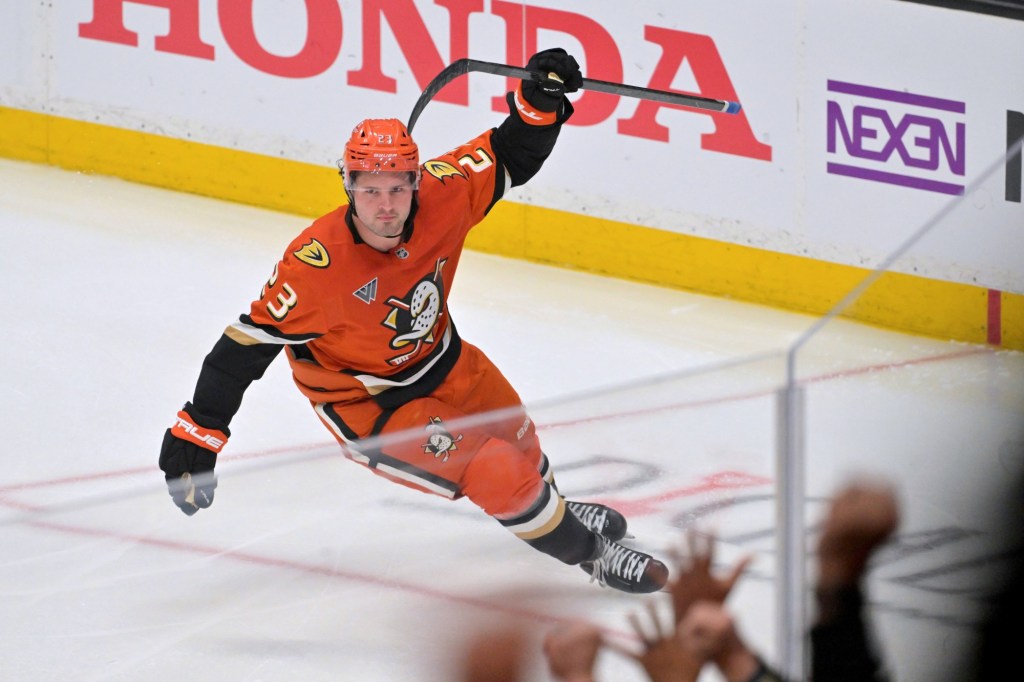
IRVINE — All told, the Ducks have been perhaps the NHL’s most active team this offseason as they brought in four new coaches, three notable veteran forwards and a goalie.
But the first two days of training camp have been marked by the absence of a familiar face, center Mason McTavish.
McTavish, a 22-year-old restricted free agent, played the best hockey of his three-year career down the stretch last season after a poor start, reifying more of the promise he displayed when the Ducks made him the third overall pick in 2021.
But McTavish joined New Jersey Devils defenseman Luke Hughes as the only high-profile restricted free agents to have reached the opening of training camp sans contract extension.
“Talks are ongoing and we’ve made a lot of progress over the summer, but we’re not there yet. So, until we get there, he won’t be here,” Ducks General Manager Pat Verbeek told reporters when camp opened on Thursday.
While Verbeek said he and his team were nearing a resolution, or as he put it, “closing in,” McTavish was already flying out earlier in the week, to Ottawa, where he could train with the Ontario Hockey League’s Ottawa 67s.
While a player without a deal in place leaving town to train is hardly unusual, he missed a big first day (and the second day Friday, at a minimum).
Thursday was the first official day of practice run by Joel Quenneville, he of four Stanley Cups but also four seasons in disgraced exile following the suspension of Quenneville, Stan Bowman and Al MacIsaac for their improper handling of a sexual abuse scandal in Chicago. Quenneville was joined by returning coach Tim Army as well as newcomers Jay Woodcroft, Ryan McGill and Andrew Brewer.
“It’s disappointing that (McTavish) is not here,” Verbeek continued. “Virtually a whole new coaching staff and the group’s really excited like I’ve never seen before. There’s a new system that’s getting implemented. There’s a lot of things to learn and it takes a lot of reps to get it under each player’s belt. When Mason gets here, he’s got a lot of catching up to do.”
The Ducks acquired Mikael Granlund, a versatile forward with experience at center; Chris Kreider, a former 50-goal scorer on the wing; and pivot Ryan Poehling, a penalty killer who can add scoring punch to the bottom six as well. They also brought in Petr Mrázek in net, with the offseason exoduses of John Gibson and Trevor Zegras coming on the heels of an in-season deal that shipped out Cam Fowler, thinning the ranks of tenured Ducks considerably.
“Last year, at times, we saw our offense wasn’t balanced enough and we didn’t have enough depth scoring, but now we’re gonna have four good lines we can throw over the boards,” forward Ryan Strome said. “Those guys have played in a lot of high-stakes situations in the playoffs and been around the league a long time.”
Strome said that while McTavish might have to play catch-up on new systems – the Ducks are moving from a man-to-man defense to a more zone-oriented look while emphasizing puck possession at the other end of the ice – he was unconcerned about the individual aspects for the “very prepared, very determined and very dedicated” McTavish.
Verbeek and the Ducks have been through similar RFA standoffs recently, twice, as two seasons ago both Jamie Drysdale and Trevor Zegras held out well into the preseason. The result? Both players sustained early-season injuries, which complicated ongoing trade talks regarding Drysdale (he was dealt to Philadelphia in January of 2024) and set in motion a series of maladies that severely diluted Zegras’ value when he landed in Philly this past summer.
Unlike those two former lottery picks, both of whom signed three-year bridge deals, McTavish is considered a cornerstone player for the Ducks going forward, with the club hoping for a long-term pact, much as the Devils are with Hughes.
He is also one of three remaining players from the roster Verbeek inherited during the 2021-22 season when he replaced Bob Murray as GM. The other two, Troy Terry and Lukáš Dostál, both signed long deals (seven and five years, respectively) as RFAs without requiring a holdout, though both had the exigency of arbitration eligibility motivating a swifter resolution.
“There was never any risk of me not being at camp because of the arbitration rights. But it’s a process, both sides have to do what’s best for themselves,” Terry said. “You hope it’s easy, but sometimes it takes a little longer.”
He added: “Mason was here. It’s not like we haven’t been skating with him. I know he’s had a great summer, he looks great and he seems like he’s in a good place mentally, too.”
Among prominent topics, running neck-and-neck with McTavish’s absence was Quenneville’s presence. The Ducks moved on from Dallas Eakins two years ago and brought in Greg Cronin for a pair of campaigns. This change, however, seemed distinct.
“It feels like it’s time now,” Terry said. “Getting to meet (Quenneville) and talk to him, he’s got kind of an aura around him. He’s so down to earth. His pedigree speaks for itself, he doesn’t need to mention it. When he talks, you want to soak up knowledge from him.”



